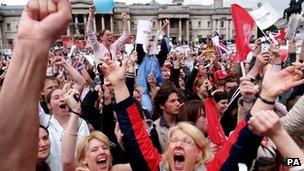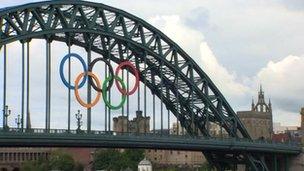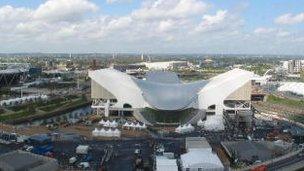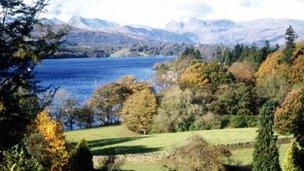Can the north gain a golden legacy from 2012 Olympics?
- Published
- comments

Will the Olympics deliver a lasting legacy outside London?
Now first let me declare an interest. I am generally an Olympic enthusiast.
I'll be glued to everything from archery to freestyle wrestling through July and August, and I've even watched the BBC's Olympic torchcam on a regular basis.
And yes, since you ask, I do actually possess some Olympic tickets.
But as a journalist, I have to ask a key question - will the Olympics really bring the benefits to the whole country that some have claimed?
Far from London
Let's take the region where I live and examine the case.
The North East and Cumbria is about as far from London as you can get in England.
But we have been told that this is an event that will benefit even the most far-flung parts of the country.
And there are some tangible benefits you can point to in the north.
The North East has its own slice of the Olympics as some of the football will be played at St James' Park.
But that is an event you can certainly get tickets for still.
When I last went on the ticketing website, you could buy up to 30 tickets a time for the games there.
It seems unlikely then that the football there will draw anywhere near as many people, or generate as much revenue as the average month of a Premiership season, even if it will see St James' Park in use in July and early August.
Training camps
There are though some competitors who will be basing their training camps in the North East, bringing some economic benefits.

The Olympic rings are on Newcastle's Tyne Bridge but will there be a lasting legacy for the North East?
Some of Sri Lanka's athletes will be in Durham, the Grenadan team will be based at Sunderland University, and there will be Colombian competitors in Gateshead.
There are businesses which have also gained economically from the Olympics.
The Olympic Delivery Authority, external estimates that North East companies have won between £120 million and £150 million worth of contracts.
That looks pretty puny compared to the £2 billion of contracts won by firms in the South East.
But compared to the £150 million won by the larger North West, £75 million won by Yorkshire and Humber, and £38 million won by Wales, it's not too shabby.
But scratch below the surface of the list I have seen of the North East's contracts and you might wonder how much of the work Barclaycard and British Telecom classed as being from the region has actually flowed into the local economy.
Vital work
Nevertheless for some the work has been vital.
Sotech in Peterlee supplied some of the guttering and fascia for the Aquatics Centre and the athletes' village, and the work was extremely useful.
Like so many, the firm was struggling with the credit crunch in 2008, so when the Olympic contracts landed, the timing couldn't have been better.

Work on the Olympic Aquatics Centre in London helped to boost jobs at a company in Peterlee
The company is now growing again and employs more people than it did four years ago.
Managing Director John Egginton said: "We had just moved into a new factory and expanded the business when the recession struck and we ended up having to lay 11 staff off.
"The year after, the Olympic work came in. Even though the recession had started we knew that work was coming so it gave you that confidence to keep going. It did help tremendously."
For other companies though the Olympics might not be such great news.
Tourism businesses in Cumbria have seen a drop in bookings from Japanese and Chinese visitors as they choose to go to London or stay away altogether.
They also fear more people will stay at home to watch the Olympics rather than head for the Lakes.
Olympic organisers hope that the games will boost all UK tourism in the long term, but it will be hard to prove whether that really will benefit the north in years to come.

There are fears that the Olympics could lead to fewer tourists visiting the Lake District
So that brings us to another key part of the supposed Olympic legacy - the idea that it will boost participation in sport and create a new healthy generation of young people.
On that I'm afraid there isn't much solid good news.
There is no evidence that sporting participation has risen in any of the countries which have hosted the games.
And in recent years the number of people engaging in sport in the UK has shown little sign of being boosted by the Olympics.
Broadly the figure has flatlined.
It might take more than the Olympics then to cure the country's obesity problems.
Grassroots sport
And there are some who suggest the games might even have damaged grassroots sport by diverting funds away from local clubs and into the Olympics.
Ian Lavery, external, the Labour MP for Wansbeck in Northumberland, has raised concerns about the loss of money for community projects.
He believes that cash now needs to come back, especially as the Olympics have come in around £500 million under budget.
In a tweet he said: "If the Olympics are £500 million under budget, why not distribute the money to facilitate sports projects in the most deprived areas in the UK?"
There is though one other tangible difference the Olympics will make in the North East and Cumbria. We'll all be able to shop later on a Sunday during the games as the trading laws are temporarily relaxed.
The change will allow large shops and businesses around the Olympic venues to trade for more than the usual six hours, but because the law has had to be varied nationally, the same relaxation will apply across England.
For some shoppers and larger businesses that might be welcome, for some workers and smaller shops, it might not be so welcome.
Olympic torch
So if I'm being honest, it's hard to make a cast-iron case for a golden Olympic legacy in the North East and Cumbria.
But then you turn on the TV or surf the web to watch the progress of the Olympic torch.
You see crowds lining the streets in the teeming rain, the thrilled faces of the torch carriers, and you realise there are benefits which are harder to measure but are most definitely there.
You can't cash in memories; they don't create jobs, they don't push people to be more active, but in decades to come there will be people who treasure the moment they were part of an Olympic summer.
You see I warned you I was an enthusiast.
- Published28 February 2012